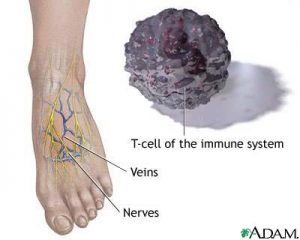Do you Suffer from Diabetic Foot Numbness?
What is Diabetic Neuropathy Numbness?
It is a complication caused by nerve damage that occurs in diabetes patients. High blood glucose levels have the potential to injure or damage nerves throughout the body. However, diabetic neuropathy usually injures nerves in the feet and legs.
However, depending on the nerves that have been affected and the level of damage, diabetic neuropathy signs and symptoms can range from numbness to pain in your feet and legs. Therefore, some people can have mild signs but for others, the condition can be disabling and quite painful.
Diabetic neuropathy affects about 50% of all diabetes patients. However, the condition can be prevented or slowed with a healthy lifestyle and consistent blood sugar management.
Symptoms of Diabetic Neuropathy
The symptoms usually depend on the nerves which have been affected and patients may not notice anything is amiss until significant damage occurs.
Peripheral Neuropathy
Peripheral neuropathy is also known as distal symmetric peripheral diabetic neuropathy and it is the most common form of diabetic neuropathy.
It usually affects the legs and feet first before progressing to the arms and hands. Symptoms of peripheral diabetic neuropathy are usually worse during the night and they may include:
- Numbness in feet and legs
- Burning or tingling sensation
- Diminished ability to feel temperature changes or pain
- Higher sensitivity to touch (even a blanket’s weight can be uncomfortable or painful for some people)
- Foot problems such as infections, ulcers, joint, and bone pain
- Cramps or sharp pains
It is recommended that testing for diabetic neuropathy start immediately after diagnosis with diabetes and annually after that.
Causes
Although the exact cause of diabetic foot numbness is not known, studies show that uncontrolled high blood glucose damages nerves over time and affects their ability to transmit signals, causing diabetic neuropathy. Moreover, high blood glucose weakens the walls of capillaries (small blood vessels) that deliver nutrients and oxygen to the nerves.
Risk factors
Although anyone suffering from diabetes can develop diabetic neuropathy, some factors increase the risk of getting nerve damage.
- Diabetes history:
The risk of developing diabetic neuropathy numbness is higher for people who have suffered from diabetes for longer, especially if their blood glucose is not well controlled.
- Uncontrolled blood sugar:
Poor blood sugar control increases the risk of all diabetes complications, including diabetic neuropathy numbness.
- Being overweight:
If you have a BMI (body mass index) of 25 of more, your risk of diabetic neuropathy is higher.
- Smoking:
Smoking hardens and narrows the arteries hence reducing blood flow to the feet and legs. Reduced blood flow causes numbness and damages peripheral nerves making it harder for wounds to heal.
- Kidney disease:
Chronic conditions such as diabetes can damage your kidneys. Damaged kidneys send toxins into your bloodstream leading to nerve damage.
Complications of Diabetic Neuropathy
Diabetic neuropathy can lead to various complications, such as:
-
Loss of a leg, foot, or toe
Nerve damage leads to loss of feeling in the feet, so cuts and other minor injuries can turn into ulcers or patients without the patient realizing it. Some cases can gradually become severe and infections can cause tissue death or spread to the bone. Amputation (removal) of the lower leg, foot or a toe may even be necessary.
-
Hypoglycemia unawareness
If your blood sugar level drops below 70 mg/dl, you may experience a fast heartbeat, sweating, and shaking. However, people with autonomic diabetes neuropathy may miss these symptoms of hypoglycemia.
-
Urinary tract infections
If nerves that control the bladder are destroyed, you may not fully empty the bladder. This can lead to the buildup of bacteria in the kidneys and bladder, causing infections of the urinary tract.
-
Sharp drop in your blood pressure
If the nerves that control blood flow are damaged, the body’s ability to control blood pressure may be affected. This can cause fainting and dizziness due to sharp drops in pressure, especially after standing.
Other complications of diabetic neuropathy include digestive problems, decreased or increased sweating, and sexual dysfunction.
How can you Prevent Diabetic Foot Numbness?
Diabetic neuropathy numbness and its complications can be prevented or delayed by managing blood glucose levels properly and taking good care of the feet.
Foot care for diabetics
Good foot care practices include:
- Checking your feet for cuts, peeling and cracked skin, swelling, redness, bruises, and blisters every day.
- Keep your feet dry and clean
- Trim toenails carefully
- Moisturize your feet
- Wear dry, clean socks
- Wear shoes that fit well
- Use cushioned shoes
Foot problems such as ulcers, sores that don’t heal and amputations are some complications of diabetes and diabetic neuropathy. However, these problems can be prevented by having a foot examination once a year and taking good care of the feet.



